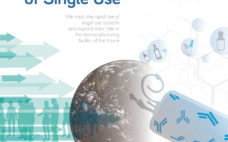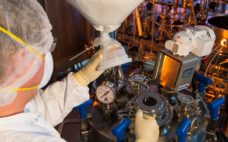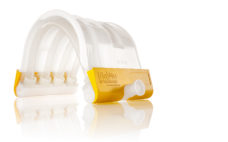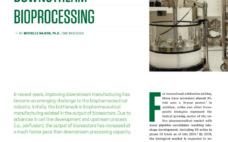Now that single-use technology plays a part in nearly all bio-production processes, what is next? Several challenges remain that are still serious enough to delay or even stop the use of single-use technology, which in turn can extend the time to market and increase the cost of lifesaving biopharmaceutical products. Of the existing difficulties, which five are the most critical? This paper considers five existing challenges in the implementation of single-use technology including scale, automation, product compatibility and compliance, speed…
BPI White Papers
Globalization of Single-Use and an Introduction to the Mobius® MyWay Portfolio
Single-use systems have enjoyed a meteoric rise in recent years and are fast becoming the go-to option for all but the biggest batches in the biopharma industry. But how do you get the most out of these exciting systems? Here, experts track the rapid evolution of single use systems, their impact on the industry and biomanufacturing, and how they will transform future manufacturing operations. Single-use is now becoming well established into an “age of optimization.” More than 90% of biopharma…
Single-Use Powder Containment for Biopharmaceutical Manufacturing
For many years, media and buffer ingredients used in powder form were transferred from stock containers using open scoops, weighed and mixed in buckets or open-top bags, and then carried in and dumped from those buckets or open-top bags directly into production vessels—based on the premise that sterility wasn’t required at that early stage of manufacturing. While much of this process was often carried out in a separate room from the production line to contain airborne contaminants, final transfer to…
Quantum ReNu SU Technology® Validation Guide and Performance Testing Summary
As the use of disposable systems within biopharmaceutical manufacturing has moved from niche preclinical applications to large scale commercial processes. This has led to the requirement for novel technologies that improve processing throughput and allow manufacturers to increase their output. To this end, WMFTG has developed a new pumping technology to enable end-users to meet their downstream processing needs for unit operations such as chromatography and tangential flow filtration (TFF). Quantum allows end-users to use novel peristaltic technology for their…
Achieving Continuous Downstream Bioprocessing Through Multi-Column Chromatography (MCC)
In recent years, improving downstream manufacturing has become an emerging challenge to the biopharmaceutical industry. Initially, the bottleneck in biopharmaceutical manufacturing existed in the output of bioreactors. Due to advances in cell line development and upstream process (i.e., perfusion), the output of bioreactors has increased at a much faster pace than downstream processing capacity. Therapeutic biologics, including monoclonal antibodies (mAbs), represent the fastest growing segment of the pharmaceutical market. By 2019, the biological market is expected to exceed 20% of…
BIOne – Single-Use Bioreactor System
Convert your existing benchtop glass bioreactor to a single-use bioreactor in seconds. Distek, Inc. has developed a benchtop scale single-use bioreactor (SUB) system for mammalian cell growth and recombinant protein production. The pre-sterilized BIOne system is engineered with a disposable headplate welded to a triple-layered liner that can be easily inserted into a non-sterile bioreactor glass vessel, converting it to a sterile, disposable SUB within a matter of seconds. Simply remove your existing headplate and place the preassembled and irradiated…
Continuous Processing Optimization With Smarter Tools
Single-use technology (SUT) has long been viewed as a viable solution to today’s biopharmaceutical manufacturing challenges. It offers the flexibility to change a production configuration to meet demand while also offering many other cost benefits, such as savings related to the elimination of clean-in-place (CIP) and sterilization-in-place (SIP) processes. However, traditional and fed-batch models fail when trying to adapt to single-use flexibility due to the required rewriting of code and revalidation. The best way to use the flexibility of single-use…
Accelerating Biosimilar Development Programs using Contract Testing and Manufacturing Organizations
A rapid increase in the number of companies working on the development and registration of biosimilars and the need to get these products to market with speed has lead biosimilar developers to turn to contract research organizations (CROs) when they lack either the internal capability or capacity for conducting certain work. Throughout the biosimilar development pathway, a product sponsor can choose to conduct the work itself or use service contractors. Contractors can be niche providers of a single aspect of…
Contract Test Services from Associates of Cape Cod, Inc.: Specializing in Testing for Endotoxin and Glucan Contamination
Associates of Cape Cod,® Inc. Contract Test Service (CTS) laboratory specializes in testing for endotoxin and glucan contamination and has notable experience in endotoxin testing. CTS performs all methods of the BET assay: gel-clot, chromogenic, and turbidimetric. CTS is GMP compliant and ISO registered. We’re licensed by the DEA as a laboratory capable of handling all controlled drug substances except those included in Schedule I. Endotoxin testing can be performed in accordance with FDA, USP, EP and/or JP, depending on…
Platform Purification of Six Biosimilar Molecules Using Amsphere A3 – Protein A Resin
Currently more than 70 biosimilar mAbs (monoclonal antibodies) are under development and multiple originator mAbs are going off-patent in the next 3-4 years. Protein A resin remains the most important workhorse for the purification of monoclonal antibodies. Protein A resin has a high impact on both development and manufacturing cost, in particular during early stage clinical phases. This application note summarizes the key performance parameters for our high capacity protein A resin, Amsphere A3, for 6 biosimilar molecules of which…








